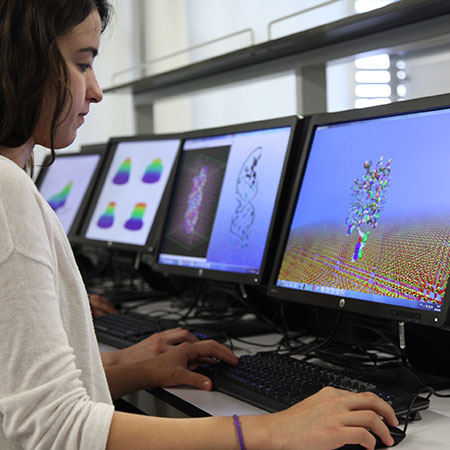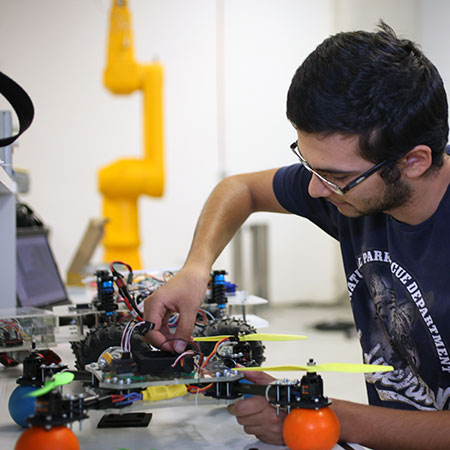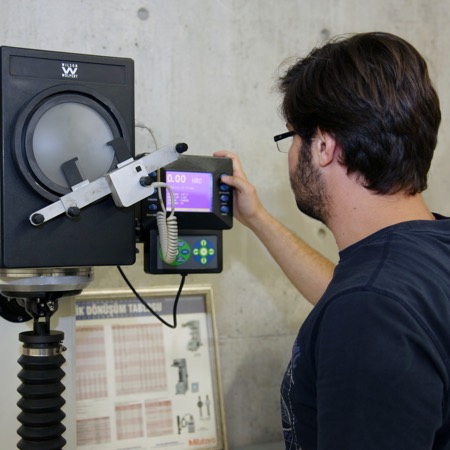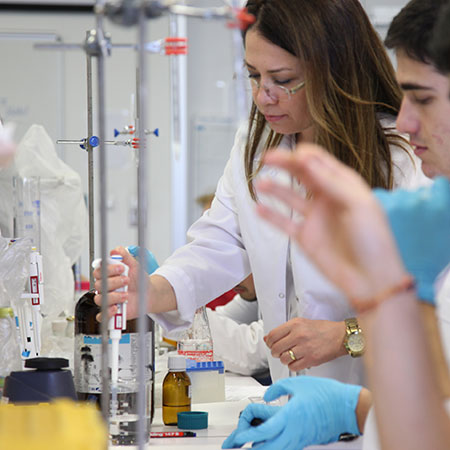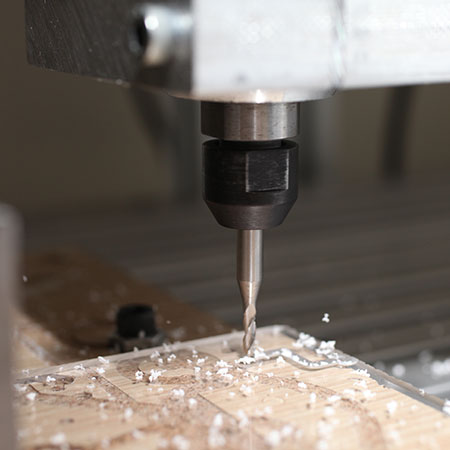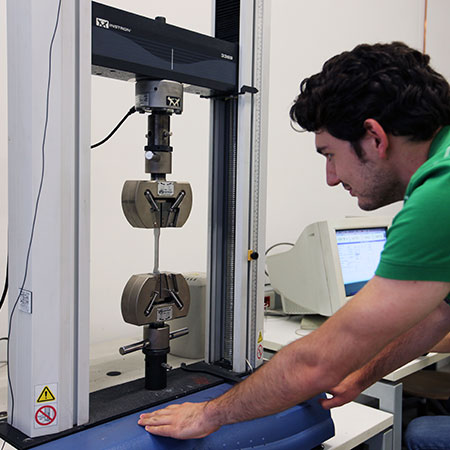Mechanical Engineering Graduate Programs
Master's Programs (With Thesis)
The master's program with thesis is composed of at least 7 courses amounting to no less than 21 credits in total, Scientific Research Techniques and Publication Ethics course, Seminar, and the Master’s Thesis.
Master's Programs (Without Thesis)
The master's program without thesis is composed of at least 10 courses amounting to no less than 30 credits in total, Scientific Research Techniques and Publication Ethics course, and the Semester Project.
Graduate Courses
|
Course Code |
Course Title |
Credits |
|
MAK 501 |
Mathematics of Engineering |
3 Credits |
|
MAK 502 |
Digital Methods in Engineering |
3 Credits |
|
MAK 503 |
Elasticity Theory |
3 Credits |
|
MAK 504 |
Plasticity Theory |
3 Credits |
|
MAK 505 |
Plate and Shells Theory |
3 Credits |
|
MAK 507 |
Breakage Mechanics |
3 Credits |
|
MAK 509 |
Continuous Environments Mechanics |
3 Credits |
|
MAK 512 |
Analysis of Finite Elements in Solid Mechanics |
3 Credits |
|
MAK 513 |
Contact Mechanics |
3 Credits |
|
MAK 514 |
Sintering Theory and Applications |
3 Credits |
|
MAK 515 |
Powder Metallurgy Techniques |
3 Credits |
|
MAK 516 |
Thermal Processing |
3 Credits |
|
MAK 520 |
Computer-Aided Design and Manufacturing (CAD/CAM) |
3 Credits |
|
MAK 521 |
Computer Assisted Integrated Manufacturing |
3 Credits |
|
MAK 522 |
Advanced Welding Methods |
3 Credits |
|
MAK 523 |
Mechanical Behavior of Materials |
3 Credits |
|
MAK 524 |
Plastic Casting of Metals |
3 Credits |
|
MAK 525 |
Machining Dynamics |
3 Credits |
|
MAK 527 |
System Architecture and Innovation |
3 Credits |
|
MAK 528 |
Sustainable Production Systems |
3 Credits |
|
MAK 530 |
Unconventional Manufacturing Methods |
3 Credits |
|
MAK 533 |
Composite Materials |
3 Credits |
|
MAK 534 |
Material Characterization Techniques |
3 Credits |
|
MAK 536 |
Nanomaterials and Nano-Technology |
3 Credits |
|
MAK 537 |
Nuclear Engineering Materials |
3 Credits |
|
MAK 538 |
Corrosion |
3 Credits |
|
MAK 539 |
Damage Analysis |
3 Credits |
|
MAK 540 |
Advanced Dynamics |
3 Credits |
|
MAK 541 |
Advanced Mechanical Vibrations |
3 Credits |
|
MAK 546 |
Fluid Power Control |
3 Credits |
|
MAK 547 |
Robotics |
3 Credits |
|
MAK 548 |
Advanced Mechanism Design |
3 Credits |
|
MAK 549 |
Advanced System Dynamics and Optimal Control |
3 Credits |
|
MAK 550 |
Measurement and Instrumentation |
3 Credits |
|
MAK 543 |
Computerized Control of Machinery |
3 Credits |
|
MAK 552 |
Introduction to Biomechanics |
3 Credits |
|
MAK 553 |
Advanced Biomechanics |
3 Credits |
|
MAK 554 |
Clinical Biomechanics of the Spine |
3 Credits |
|
MAK 558 |
Vehicle Dynamics |
3 Credits |
|
MAK 560 |
Advanced Thermodynamics |
3 Credits |
|
MAK 561 |
Mass Transfer |
3 Credits |
|
MAK 562 |
Advanced Fluid Mechanics |
3 Credits |
|
MAK 563 |
Computational Fluid Dynamics |
3 Credits |
|
MAK 564 |
Heat Transfer |
3 Credits |
|
MAK 565 |
Heat Transfer through Convection |
3 Credits |
|
MAK 566 |
Thermal Radiation |
3 Credits |
|
MAK 568 |
Internal Combustion Engines |
3 Credits |
|
MAK 569 |
Combined Heat-Power Plants |
3 Credits |
|
MAK 570 |
Combustion Systems |
3 Credits |
|
MAK 571 |
Renewable Energy Systems |
3 Credits |
|
MAK 572 |
Boundary Layer Theory |
3 Credits |
|
MAK 573 |
Turbulence |
3 Credits |
|
MAK 574 |
Turbulence Modeling and Simulation |
3 Credits |
|
MAK 575 |
Statistical Thermodynamics |
3 Credits |
|
MAK 576 |
Gas Dynamics |
3 Credits |
|
MAK 577 |
Two-Phase Flow and Heat Transfer |
3 Credits |
|
MAK 578 |
Fuel Cells |
3 Credits |
|
MAK 580 |
Advanced Thermal Design |
3 Credits |
|
MAK 581 |
Heat Transfer in Micro- and Nano-Systems |
3 Credits |
|
MAK 582 |
Parallel Programming for Computational Sciences |
3 Credits |
|
MAK 583 |
Experimental Fluid Mechanics |
3 Credits |
|
MAK 585 |
Aeroacoustics |
3 Credits |
|
MAK 597 |
Seminar |
0 Credits |
|
MAK 598 |
Semester Project |
0 Credits |
|
MAK 599 |
Master's Thesis |
0 Credits |
|
MAK 698 |
Advanced Research Topics |
3 Credits |
|
MAK 699 |
Ph.D. Thesis |
|
*) MAK 501 and MAK 502 courses are must courses of the Master’s Program. Students who had taken these courses at TOBB ETÜ or another higher education institution prior to their registration with the program, can be exempted from the said courses, or may be required to take other courses instead.
*) At least half of the required credits in the master’s program should be obtained from MAK 5XX/6XX courses.
For those admitted on the basis of a master’s degree; the Ph.D program is composed of at least 7 courses amounting to no less than 21 credits in total, Scientific Research Techniques and Publication Ethics course, Seminar, Ph.D. Qualification, and the Ph.D. Thesis
For those admitted into the Integrated Ph.D. Program on the basis of a bachelor’s degree; the program is composed of at least 14 courses amounting to no less than 42 credits in total, Scientific Research Techniques and Publication Ethics course, Seminar, Ph.D. Qualification, and the Ph.D. Thesis.
The programs developed under Mechanical Engineering can be classified in 3 major categories:
- Structure, Material and Manufacturing
- Dynamics, Control and Automation
- Heat, Fluids, and Energy
Graduate Courses
|
Course Code |
Course Title |
Credits |
|
MAK 501 |
Mathematics of Engineering |
3 Credits |
|
MAK 502 |
Digital Methods in Engineering |
3 Credits |
|
MAK 503 |
Elasticity Theory |
3 Credits |
|
MAK 504 |
Plasticity Theory |
3 Credits |
|
MAK 505 |
Plate and Shells Theory |
3 Credits |
|
MAK 507 |
Breakage Mechanics |
3 Credits |
|
MAK 509 |
Continuous Environments Mechanics |
3 Credits |
|
MAK 512 |
Analysis of Finite Elements in Solid Mechanics |
3 Credits |
|
MAK 513 |
Contact Mechanics |
3 Credits |
|
MAK 514 |
Sintering Theory and Applications |
3 Credits |
|
MAK 515 |
Powder Metallurgy Techniques |
3 Credits |
|
MAK 516 |
Thermal Processing |
3 Credits |
|
MAK 521 |
Computer Assisted Integrated Manufacturing |
3 Credits |
|
MAK 522 |
Advanced Welding Methods |
3 Credits |
|
MAK 523 |
Mechanical Behavior of Materials |
3 Credits |
|
MAK 524 |
Plastic Casting of Metals |
3 Credits |
|
MAK 527 |
System Architecture and Innovation |
3 Credits |
|
MAK 528 |
Sustainable Production Systems |
3 Credits |
|
MAK 530 |
Unconventional Manufacturing Methods |
3 Credits |
|
MAK 533 |
Composite Materials |
3 Credits |
|
MAK 534 |
Material Characterization Techniques |
3 Credits |
|
MAK 536 |
Nanomaterials and Nano-Technology |
3 Credits |
|
MAK 537 |
Nuclear Engineering Materials |
3 Credits |
|
MAK 538 |
Corrosion |
3 Credits |
|
MAK 539 |
Damage Analysis |
3 Credits |
|
MAK 540 |
Advanced Dynamics |
3 Credits |
|
MAK 541 |
Advanced Mechanical Vibrations |
3 Credits |
|
MAK 546 |
Fluid Power Control |
3 Credits |
|
MAK 547 |
Robotics |
3 Credits |
|
MAK 548 |
Advanced Mechanism Design |
3 Credits |
|
MAK 549 |
Advanced System Dynamics and Optimal Control |
3 Credits |
|
MAK 552 |
Introduction to Biomechanics |
3 Credits |
|
MAK 553 |
Advanced Biomechanics |
3 Credits |
|
MAK 554 |
Clinical Biomechanics of the Spine |
3 Credits |
|
MAK 543 |
Computerized Control of Machinery |
3 Credits |
|
MAK 558 |
Vehicle Dynamics |
3 Credits |
|
MAK 560 |
Advanced Thermodynamics |
3 Credits |
|
MAK 561 |
Mass Transfer |
3 Credits |
|
MAK 562 |
Advanced Fluid Mechanics |
3 Credits |
|
MAK 563 |
Computational Fluid Dynamics |
3 Credits |
|
MAK 564 |
Heat Transfer |
3 Credits |
|
MAK 565 |
Heat Transfer through Convection |
3 Credits |
|
MAK 566 |
Thermal Radiation |
3 Credits |
|
MAK 568 |
Internal Combustion Engines |
3 Credits |
|
MAK 569 |
Combined Heat-Power Plants |
3 Credits |
|
MAK 570 |
Combustion Systems |
3 Credits |
|
MAK 571 |
Renewable Energy Systems |
3 Credits |
|
MAK 572 |
Boundary Layer Theory |
3 Credits |
|
MAK 573 |
Turbulence |
3 Credits |
|
MAK 574 |
Turbulence Modeling and Simulation |
3 Credits |
|
MAK 575 |
Statistical Thermodynamics |
3 Credits |
|
MAK 576 |
Gas Dynamics |
3 Credits |
|
MAK 577 |
Two-Phase Flow and Heat Transfer |
3 Credits |
|
MAK 578 |
Fuel Cells |
3 Credits |
|
MAK 580 |
Advanced Thermal Design |
3 Credits |
|
MAK 581 |
Heat Transfer in Micro- and Nano-Systems |
3 Credits |
|
MAK 582 |
Parallel Programming for Computational Sciences |
3 Credits |
|
MAK 583 |
Experimental Fluid Mechanics |
3 Credits |
|
MAK 585 |
Aeroacoustics |
3 Credits |
|
MAK 597 |
Seminar |
0 Credits |
|
MAK 598 |
Semester Project |
0 Credits |
|
MAK 599 |
Master's Thesis |
0 Credits |
|
MAK 698 |
Advanced Research Topics |
3 Credits |
|
MAK 699 |
Ph.D. Thesis |
0 Credits |
Ph.D. Qualification Exam
1) Ph.D. Qualification Exam is held once or twice a year on the basis of the demand, in June-July and/or December-January, and entails two stages –written and oral. The process is completed within one week.
2) Each student is required to choose one major and one minor.
3) The written stage is composed of two distinct exams –Basic Exam and Advanced Exam.
4) The Basic Exam covers three of the basic issues in the selected major, and one of the basic issues in the selected minor, and is held in a single session. A total of twelve questions –three on each topic– are asked in the exam. The student should choose two questions on each topic to answer, amounting to a total of eight. Each question bears equal weight, and the exam is reviewed on a scale of 100.
5) The advanced exam covers three advanced courses to be chosen by the student from her major, and is again held in a single session. A total of nine questions –three on each topic– are asked in the exam. The student chooses two questions on each course. Each question bears equal weight, and the exam is reviewed on a scale of 100.
6) For the student to pass the written stage, she should score at least 50% in each topic of the Basic Exam, and score at least 65/100 on both the Basic Exam and the Advanced Exam overall.
7) Those who fail once in the written stage shall be included in the next Ph.D. Qualification Exam round once again.
8) Those who succeed in the written stage will be directed to the verbal one. In the oral stage, the student shall be required to respond to questions on the topics covered in the Basic Exam, and the courses covered in the Advanced Exam.
9) Those who fail once in the oral stage shall be included in the oral stage of the next Ph.D. Qualification Exam round once again.
Ph.D. Qualification Areas in Mechanical Engineering
|
|
ENERGY |
MECHANICS |
MACHINE THEORY and DYNAMICS |
MATERIAL SCIENCE and MANUFACTURING METHODS |
|
BASIC ISSUES |
Thermodynamics |
Dynamics |
Dynamics |
Material Science |
|
Fluid Mechanics |
Resistance |
Machine Theory |
Manufacturing Methods |
|
|
Heat Transfer |
Machine Elements |
System Dynamics and Control |
Design and Production |
|
|
ADVANCED TOPICS |
Advanced Fluid Mechanics |
Advanced Resistance |
Advanced System Dynamics and Optimal Control |
Thermal Processing |
|
Heat Transfer through Conduction |
Elasticity Theory |
Robotics |
Powder Metallurgy Techniques |
|
|
Heat Transfer through Convection |
Continuous Environments Mechanics |
Advanced Dynamics |
Sustainable Production Systems |
|
|
Boundary Layer Theory |
Plasticity Theory |
Advanced Mechanical Vibrations |
System Architecture and Innovation |
|
|
|
|
|
Plastic Casting of Metals |
|
|
|
|
|
Mechanical Behavior of Materials |
|
|
|
|
|
Computer Assisted Integrated Manufacturing |
*) MAK 501 course is a must course in the Ph.D. program. Students who had taken this course at TOBB ETÜ or another higher education institution prior to their registration with the program, can be exempted from the said course, or may be required to take other courses instead.
*) At least half of the required credits in the Ph.D. program should be obtained from MAK 5XX/6XX courses.
Scientific Preparation Program
- Students who are admitted into the Master's and Ph.D. programs of the department, on the basis of a bachelor’s degree in another program shall be enrolled in the scientific preparation program.
- The students enrolled in the scientific preparation program shall take at least 2 and at most 3 courses, on the basis of the advisor’s recommendation, from among the courses in the field the student will be studying in.
- No prerequisites apply for the courses in the scientific preparation program.
- If the student had taken any of the courses included in the scientific preparation program, during her undergraduate education, she will be exempted from that course.
Heat-Fluids Area:
|
Course Code |
Course Title |
|
MAK 001 |
Thermodynamics |
|
MAK 002 |
Heat Transfer |
|
MAK 011 |
Fluid Mechanics |
Mechanics Area:
|
Course Code |
Course Title |
|
MAK 004 |
Static |
|
MAK 006 |
Resistance |
|
MAK 017 |
Material Science |
Material-Manufacturing Area:
|
Course Code |
Course Title |
|
MAK 017 |
Material Science |
|
MAK 018 |
Manufacturing Methods |
|
MAK 007 |
Design and Production |
|
MAK 009 |
Material Science and Manufacturing Methods |
Dynamics-Control Area:
|
Course Code |
Course Title |
|
MAK 003 |
Dynamics |
|
MAK 005 |
System Dynamics and Control |
|
MAK 016 |
Machine Theory |


